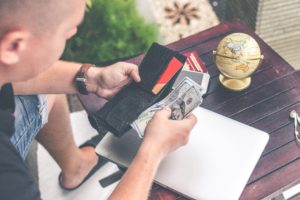Your lines of credit, your bank accounts, your good financial reputation — all of them are potential targets for criminals. Identity theft impacted a record 16.7 million people last year alone. And this persistent crime can undo the hard work you’ve put into your journey to Financial Freedom.
So knowing how to spot the symptoms of identity theft early, and stop the problem before your long-term finances are damaged, is critical. Here’s your game plan for doing just that.
Where To Look For Fraud
There are two major problems to watch for in protecting your identity from harm:
1. New credit opened in your name
Criminals only need a few pieces of your personal information to pose as you and take out credit as you. They might open a new credit card or even take out a loan using your details. And, when they invariably fail to pay up, you’re left fending off angry creditors.
 The best place to spot accounts that don’t belong to you? Check your three free credit reports annually. All your lines of credit and loans should appear directly on there. Review every liability that’s listed to ensure it truly belongs to you.
The best place to spot accounts that don’t belong to you? Check your three free credit reports annually. All your lines of credit and loans should appear directly on there. Review every liability that’s listed to ensure it truly belongs to you.
2. Illegal access to your existing credit
Surprisingly, the vast majority of identity theft — more than 80% — comes in the form of fraud related to your existing accounts. Why? Because the banking and credit card systems provide so little security, stolen information is inevitable. So keep close tabs on the financial accounts you already have:
- Check your statements monthly. Review each banking and credit account statement thoroughly to confirm that all transactions listed were initiated by you or another authorized user.
- Set up automated alerts. Your credit and debit cards likely allow you to customize notification settings. For instance, you can choose to receive an email or text every time someone makes a purchase above a certain dollar threshold or without the actual card in hand.
- Watch that credit report. Your report shows detailed information on the health of your existing accounts. Keep in mind that while bad data may be simply a reporting error, it could also indicate that someone is posing as you financially.
What to do if you’re a victim of identity theft
It’s happened. Your identity has been hacked. Someone used your credit card or taken out a loan in your name without your consent. And stopping the problem from spreading is job #1 right now.
 So take these steps immediately upon discovering identity theft:
So take these steps immediately upon discovering identity theft:
- Initiate a charge dispute. Contact your bank or credit card service department right away. (Many offer both phone consultations as well as a simple online process.) Identify all the transactions that don’t belong to you.
- Request new digits. If your credit card or debit card number was swiped, you can likely keep your existing account open but request a brand-new card number. But your old card will be shut down and become useless to a criminal who pilfered the numbers.
- Update your password. If you suspect someone accessed your account online, a password update is in order. Make sure your new password is strong and significantly different from your old one.
- Request a fraud alert. Contact one of the main credit reporting agencies (Equifax, Experian or TransUnion), and set a fraud alert on your credit history. (The first 90 days are free for victims of identity theft.) And you’ll be protected across the board, because whichever agency you contact is required by law to communicate your request to the other two bureaus
What’s next?
Now that you’ve put out the fire, take steps to protect yourself going forward:
- Consider credit monitoring. Credit monitoring services babysit your financial reputation and report potential problems to you. Most also provide the resources to handle the majority of fraud issues that might occur.
- Keep your financial information safe. I shouldn’t need to remind you to create strong passwords for your digital data, but we all know the temptation of using the same password multiple times. So set up a system, and create passwords that will Protect You.Also protect your paper records, as identity thieves still resort in surprising measure to grabbing your information directly from the trash. Don’t keep sensitive documents in public places (like an unlocked drawer at the office), and shred unwanted documents before throwing them out.
- Schedule appointments with yourself to check for fraud. Sustained vigilance is key to catching identity theft issues early on. Set up reminders to reviewing account statements, check credit reports and ensure your financial health.
No one wants to be a victim. But the sad fact is that identity theft is a widespread problem. If your credit reputation is compromised, take these steps to protect yourself and keep your journey to Financial Freedom going strong.
image credit: Bigstock/Wayhome Studio
Dr. Tony is the co-founder of MindShift.money and the best-selling author of three books on personal and business finances. Having achieved Financial Freedom at 27, Dr. Tony believes that through Financially Fit Bootcamp and Cash Flow Cure everyone can get there. He has made it his life’s mission to help others live a life where their money works for them—not the other way around.
